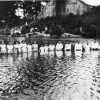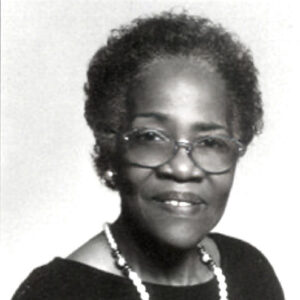calsfoundation@cals.org
Theressa Hoover (1925–2013)
Theressa Hoover worked for human rights and unity through the United Methodist Church for nearly fifty years. Born in Arkansas, she represented those who, in the words of her 1974 monograph, were in “triple jeopardy”: female, African American, and Christian. Hoover worked for justice and empowerment for women and children around the globe. Her influence has been far-reaching, as she provided inspiration for others through her words and actions.
Theressa Hoover was born in Fayetteville (Washington County) on September 7, 1925. She was one of five children of James C. Hoover and Rissie Vaughn. Her mother died when Hoover was a small child, and she was reared by her father, who worked for many years at City Hospital in Fayetteville. Hoover attended elementary school in Fayetteville but could not attend the segregated high school. Instead, she went to live with an aunt in Atlanta, Texas, until she graduated. She returned to Arkansas to study at Philander Smith College, where she received her bachelor’s degree in business administration in 1946.
Hoover worked for the Little Rock Methodist Council as associate director. Her work in this position included a project directed toward offering outdoor recreation opportunities for African Americans in Little Rock (Pulaski County). This project brought her to the attention of the Methodist Church’s governing body. In 1948, she was hired by the Women’s Division of the United Methodist Church as a field worker to assist in the integration of Methodist churches in Little Rock and then throughout the nation. She moved to New York during the decade she spent in this position and received her MA in human relations and social policy from the Steinhardt School of New York University in 1962.
Hoover rose through the ranks of the church government to become head of staff of the Women’s Division of the General Board of Global Ministries of the United Methodist Church in New York City. Time magazine described her as “a highly influential Methodist bureaucrat.” Asked about this description, Hoover said, “If you’re going to be a bureaucrat, you ought to be a good one. I was a good one.” She was known for her support of women, in particular women of color, using her strong communication skills to smooth integration and inclusion for those who had been excluded in the past.
In the course of her career, Hoover worked in all fifty states, as well as Pakistan and India. She wrote “Black Women and the Churches: Triple Jeopardy,” anthologized in Sexist Religion and Women in the Church: No More Silence in 1974, and With Unveiled Face: Centennial Reflections on Women and Men in the Community of the Church in 1983, as well as regular columns in Response magazine. All these publications, and most of Hoover’s speeches, focused on power and equality for women and for people of color in the church and in society.
Hoover also served on the Commission on the Churches’ Participation in Development of the World Council of Churches, the Methodist Church’s Joint Commission on Church Union, the executive board of the National Council of Negro Women, the National Board of the Young Women’s Christian Association (YWCA), the National Council of Negro Women, and the board of the Bossey Ecumenical Institute in Celigny, Switzerland. She retired in 1990 and spent the next ten years traveling and speaking before retiring to Fayetteville, where she lives as of 2009.
On October 6, 1990, the Women’s Division of the United Methodist Church established a $100,000 Theressa Hoover Community Service and Global Citizenship fund in her honor, providing grants for young women to travel and study. In 2000, Hoover was inducted into the Arkansas Black Hall of Fame. In 2004, Hoover was on Ebony magazine’s list of the 100 most influential African-American women. The Theressa Hoover United Methodist Church in Little Rock was named for her. In May 2008, a scholarship was established in Hoover’s honor at the University of Arkansas (UA) in Fayetteville, supporting students from Fayetteville High School.
Hoover never married. She had a grandniece who bears her name and had said that she feels that she has served as a mother and a grandmother to dozens of young women.
Hoover died in Fayetteville on December 21, 2013, and was buried in Oak Cemetery.
For additional information:
Hoover, Theressa. With Unveiled Face: Centennial Reflections on Women and Men in the Community of the Church. Cincinnati, OH: United Methodist Church, 1983.
Hughie, Donna. “One Church and One Woman.” Unpublished work, 2004. On file at Fayetteville Public Library, Fayetteville, Arkansas.
Jines, Billie. “Official Duty Brings Theressa Hoover Home to Fayetteville.” Springdale News. April 24, 1964.
Ostling, Richard N., et al. “Those Mainline Blues.” Time, May 22, 1989, pp. 94–96. Online at http://content.time.com/time/subscriber/article/0,33009,957726,00.html (accessed April 12, 2022).
“Theressa Hoover.” Methodist Mission Bicentennial. http://methodistmission200.org/hoover-theressa/ (accessed April 12, 2022).
Tracy, Dustin. “New Scholarship Will Help Minorities at FHS.” Northwest Arkansas Times. July 29, 2008, p. 5A.
Wallace, April. “Female Firebrand.” Arkansas Democrat-Gazette, November 4, 2023, pp. 4B, 5B. Online at https://www.arkansasonline.com/news/2023/nov/04/theressa-hoover-was-fayettevilles-most-famous/ (accessed November 6, 2023).
Rebecca Haden
Fayetteville, Arkansas
 Divergent Prosperity and the Arc of Reform, 1968–2022
Divergent Prosperity and the Arc of Reform, 1968–2022 Religion
Religion Theressa Hoover
Theressa Hoover 




Comments
No comments on this entry yet.